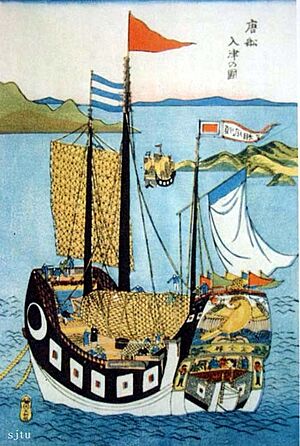Sakoku facts for kids

Sakoku (pronounced Sah-koh-koo) was a special rule in Japan. Its name in Japanese (鎖国) means "closed country" or "locked country." This rule meant that almost no one from other countries could enter Japan. Also, Japanese people were not allowed to leave. If they did, they faced a very serious punishment.
The government of Japan at that time was called the Tokugawa Shogunate. They put these rules in place between 1633 and 1639. The rules stayed for a long time, until 1853. Even after that, it was still against the law for Japanese people to leave until 1868.
But Japan was not totally cut off from the world. The Sakoku policy was more about having very strict rules. These rules controlled trade and how Japan dealt with other countries.
Japan Opens Up
On July 8, 1853, a man named Commodore Matthew Perry arrived in Japan. He was from the U.S. Navy. He came with four large warships. Commodore Perry asked Japan to open its doors for trade with Western countries.
The next year, in 1854, Perry returned. This time, he had seven ships. He strongly encouraged the Shogun (Japan's military ruler) to sign a special agreement. This agreement was called the "Treaty of Peace and Amity." It officially started friendly relations between Japan and the United States.
Images for kids
-
The son of Nadar, photographed with members of the Second Japanese Embassy to Europe in 1863. Photographed by Nadar.
See also
 In Spanish: Sakoku para niños
In Spanish: Sakoku para niños
 | Jessica Watkins |
 | Robert Henry Lawrence Jr. |
 | Mae Jemison |
 | Sian Proctor |
 | Guion Bluford |





